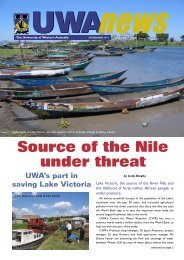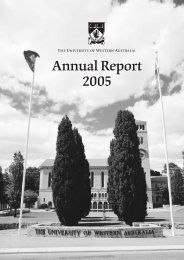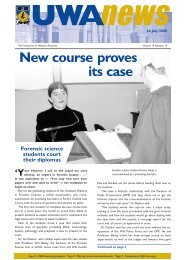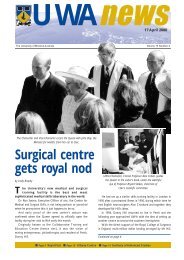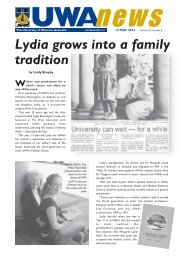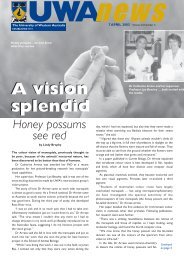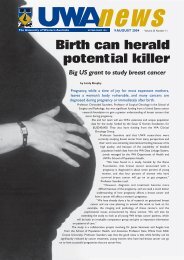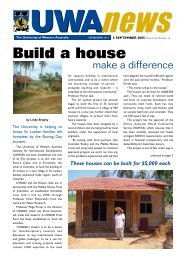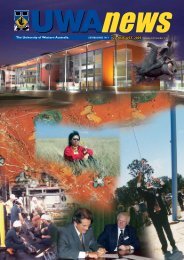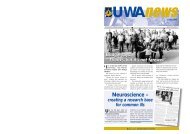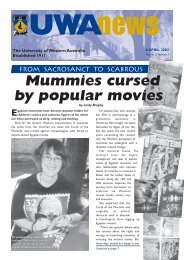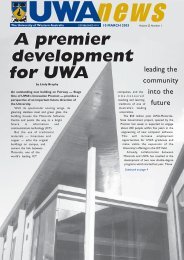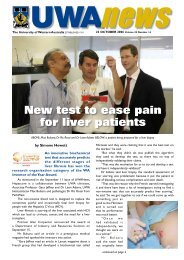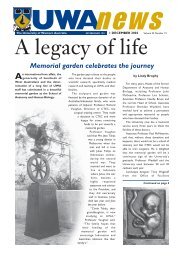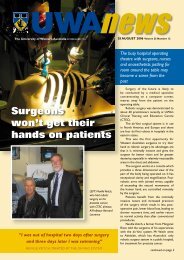Untitled - Annual Report 2004 - The University of Western Australia
Untitled - Annual Report 2004 - The University of Western Australia
Untitled - Annual Report 2004 - The University of Western Australia
Create successful ePaper yourself
Turn your PDF publications into a flip-book with our unique Google optimized e-Paper software.
ResearchONE OF the most significant events <strong>of</strong> the <strong>2004</strong>research calendar was the award <strong>of</strong> two <strong>Australia</strong>nResearch Council (ARC) Federation Fellowshipshosted at <strong>The</strong> <strong>University</strong> <strong>of</strong> <strong>Western</strong> <strong>Australia</strong>.Pr<strong>of</strong>essor Leigh Simmons is an evolutionary biologist who was one <strong>of</strong> the successful candidates and has beenwith the School <strong>of</strong> Animal Biology (formerly the Department <strong>of</strong> Zoology) for almost a decade, which is evidence <strong>of</strong>the high quality international research undertaken at the <strong>University</strong>. <strong>The</strong> second Federation Fellow, Pr<strong>of</strong>essorSteven Smith, has recently moved from the <strong>University</strong> <strong>of</strong> Edinburgh and will be a welcome addition to the UWASchool <strong>of</strong> Biochemical and Chemical Sciences in the area <strong>of</strong> plant and molecular biology. Pr<strong>of</strong>essor Smith will beresearching metabolic and genetic approaches to the discovery <strong>of</strong> genes that direct carbon partitioning in plants,which ultimately determines crop productivity and quality for improved varieties.In <strong>2004</strong> the <strong>University</strong> was also successful in winning two ARC Research Networks designed to encouragecollaborative approaches to research in interdisciplinary settings. ARC Research Networks are platforms for generatingnew knowledge in areas that span traditional disciplinary boundaries and link researchers, research groups and othersinvolved in innovation; nationally and internationally. <strong>The</strong> ARC Research Networks hosted at UWA include a Network inEarly European Research (NEER) which focuses on enhancing <strong>Australia</strong>n research into the culture and history <strong>of</strong> Europebetween the fifth and nineteenth centuries, and an <strong>Australia</strong>n Research Alliance for Children and Youth (ARACY) FutureGeneration Network that concentrates on understanding the complexity <strong>of</strong> pathways contributing to the healthydevelopment <strong>of</strong> children and young people in modern societies like <strong>Australia</strong>, and on developing effective strategies toimprove them. Both networks were awarded a little over $1.6 million over five years.<strong>The</strong> <strong>2004</strong> ARC and NHMRC grant application rounds proved to be very successful for UWA with the amount <strong>of</strong>ARC funding for Discovery-Projects increasing by nearly 80 per cent to reach $13.7 million, with a similar 60 per centincrease in NHMRC Project funding totalling $15.6 million. Importantly, the <strong>University</strong>’s strategy to increase theamount <strong>of</strong> funding per grant was rewarded by an increase in the average ARC grant size from $248,000 to $360,000,so that researchers now have more flexibility to undertake their work while the <strong>University</strong> benefits by having more<strong>of</strong> the actual costs <strong>of</strong> each project funded.This strong performance in winning <strong>Australia</strong>n Competitive Grants by the <strong>University</strong> follows the significantincrease (20 per cent) in UWA’s total research income in 2003 compared with the previous year.<strong>The</strong> UWA Office <strong>of</strong> Industry and Innovation (OII) facilitated the commercialisation <strong>of</strong> the <strong>University</strong>’sresearch with 21 invention disclosures and nine licensing agreements negotiated in <strong>2004</strong>. OII also had a role innegotiating a further 34 industry research contracts to a total value <strong>of</strong> $4.75 million. Following a review <strong>of</strong> theOII in <strong>2004</strong> it was recommended that a new project manager be employed to help facilitate links with businessand industry, and this will be a major focus in 2005.In <strong>2004</strong> the Institute <strong>of</strong> Advanced Studies (IAS) continued to make new partnerships and build adynamic space for exchanges at UWA. <strong>The</strong> core work included two programmes: Diversity Dialogues andHuman Rights and the Protection <strong>of</strong> Innocence. <strong>The</strong> Pr<strong>of</strong>essor-at-Large scheme <strong>of</strong>fered opportunities forcross-disciplinary research, and an ambitious two-week workshop on molecular biophysics run by a USteam <strong>of</strong> five led by Pr<strong>of</strong>essor Klaus Schulten, attracted postgraduate students and other researchersfrom across <strong>Australia</strong> as well as Europe. <strong>The</strong> IAS hosted visits by numerous distinguished scholars in<strong>2004</strong>, welcomed 8000 visitors, participated in planning workshops for ARC Network bids (includingthe successful one in Early European Research), and hosted the visit <strong>of</strong> Pr<strong>of</strong>essor Fotis Kafatos,Director-General <strong>of</strong> the European Molecular Biology Laboratory, in the service <strong>of</strong> potentialcollaborations and partnerships.page 19



